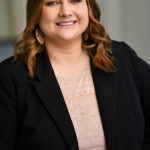
Leslie Massicotte, Trained Sexuality Educator
Leslie Massicotte is pursuing her Master’s in Education in the Human Sexuality program at Widener University. As a public health professional and consultant, Leslie has led several teacher training programs for public health workers overseas in areas of sexual and reproductive health. She is excited to share about her recent trip to the Dominican Republic to lead a teacher training for her youth reproductive health program called “BodyTalk.” This post specifically addresses MCH Core Competency 9: Developing Others Through Teaching, Coaching, and Mentoring.
Sexual and reproductive health is an often overlooked part of the public health field. This is despite the fact that sexuality impacts each and every one of the 7.5 billion people in the world. We all have bodies, identities, and relationships, yet access to fact-based, comprehensive sexuality education (CSE) on these topics remains limited, both in the U.S. and globally (See Guttmacher and AASECT).
In developing countries with underdeveloped sexual health programming and limited funding, this education becomes even less accessible. In the Dominican Republic, only 7% of students have access to sexuality education through school (see Sexuality Policy Watch), and 37% of girls under the age of 18 are pregnant, according to a 2015 UNICEF report. The Centro Educativo Toribio elementary school in the Dominican Republic saw this statistic firsthand when several of their female students, all under 13 years old, dropped out due to pregnancy.
In February 2019, Centro Educativo Toribio in collaboration with Canadian charity Rubens Shoes invited me to launch my sexual and reproductive health program, “BodyTalk,” in hopes of addressing this issue. BodyTalk can be catered to youth between the ages of 8 and 19 and covers developmentally and age-appropriate information on a variety of sexual health topics for youth in developing countries.
During this trip, I trained 10 local facilitators to implement the BodyTalk program at their elementary school, building their knowledge of HIV, gender equity, consent, and other reproductive health topics. The 11 hours of training covered information sessions on sexuality, reproductive anatomy, and consent and offered the trainees opportunities to participate in activities from the curriculum they would soon be teaching.
The need for CSE in the Dominican Republic became especially clear during the lesson on condoms in which a shocking number of participants, including my soon-to-be-married translator, had never seen a condom before. “Do all condoms really have lubricant?!” “Why is lubricant necessary?” “I never knew you were supposed to leave space at the tip of the condom!” Negotiating condom use in a country where a mere 2% of the population uses condoms is tough (see Human Rights Watch); learning that it’s your right to demand their use can be life changing and empowering–for facilitators and their students alike.
Another participant was excited to learn about PrEP, the medicine you can take to prevent HIV. While it’s unclear whether PrEP is available yet in the DR, facilitators learned that it’s still key to talk to a health professional about your options if you think you’ve been exposed to HIV.
In addition to focusing on safe sex practices, BodyTalk also emphasizes empowerment and consent. During a session on gender equity, one participant explained that she liked that I emphasized the fact that women and girls have power. This is so important for preventing abuse, especially in a country where domestic violence was the fourth leading cause of death for women in 2000 (see Human Rights Watch). Learning to communicate, understanding consent, and knowing how to find help is crucial for young people, especially girls, to feel safe and to avoid risky situations.
The facilitators learned these lessons and more and then put their knowledge to the test by leading practice sessions of the curriculum amongst themselves.
After graduating from the training program, the facilitators implemented BodyTalk for 22 students in grades 4 and 5 at Centro Educativo Toribio and plan to continue implementing it in each new class. The teachers shared that they are also spreading the information beyond their school to family members and church communities. Investing in teachers in developing countries through teaching, coaching, and mentoring, specifically in the sexual and reproductive health field, is so important for the health and safety of youth and communities. By empowering local teachers and expanding their knowledge of sexual and reproductive health, we can promote safer and healthier communities worldwide.
This post is co-authored by Gray Taylor, a co-editor of this blog and an MPH student at the University of Washington studying epidemiology with a focus on MCH. Her studies are affiliated with the University of Washington’s Center of Excellence in Maternal and Child Health.

